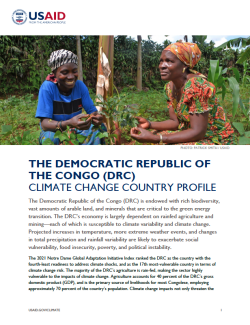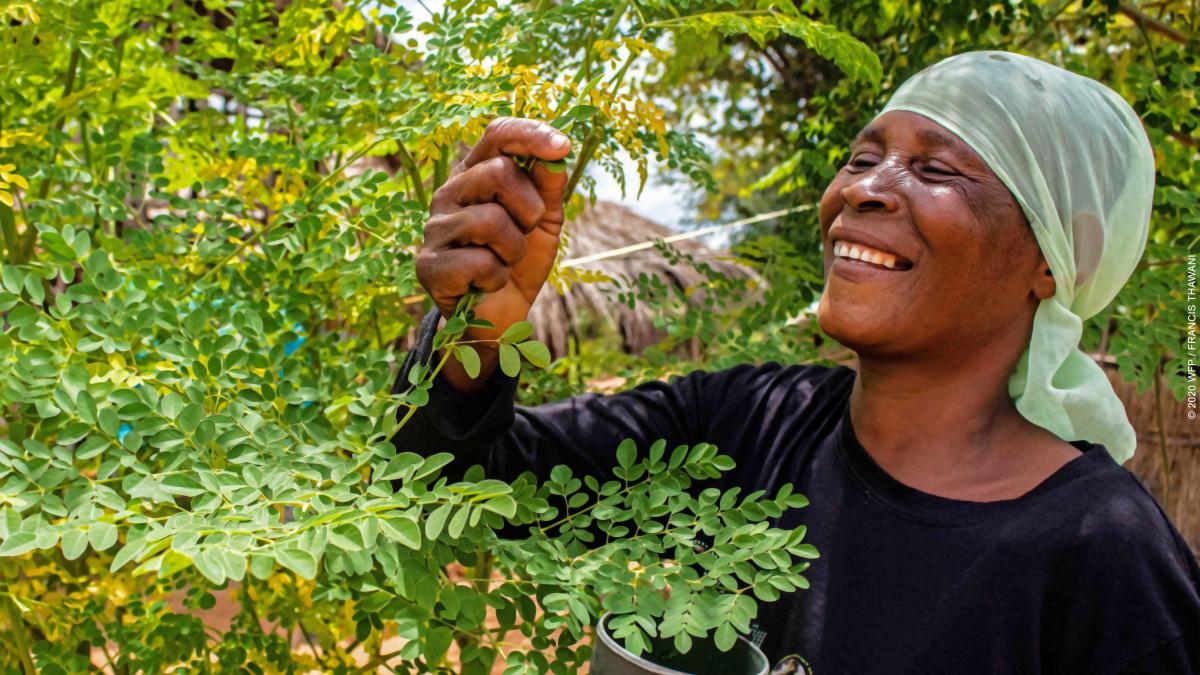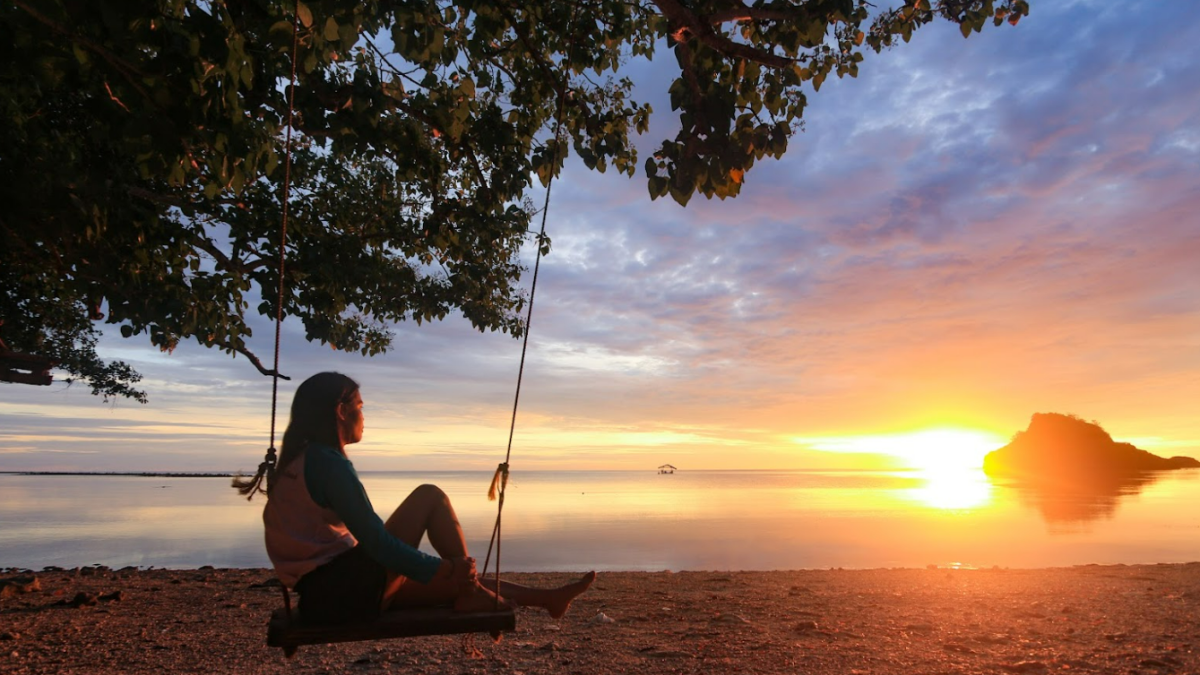The Democratic Republic of Congo (DRC) is endowed with rich biodiversity, vast arable land, and minerals that are critical to the green energy transition. DRC’s economy is largely dependent on rainfed agriculture and mining, each susceptible to climate variability and change. Projected increases in temperature, more extreme weather events, and changes in total precipitation and rainfall variability are likely to exacerbate social vulnerability, food insecurity, high rates of poverty, and political instability.
The 2021 Notre Dame Global Adaptation Initiative Index ranked the DRC as the country with the fourth-least readiness to address climate shocks, and as the 17th most-vulnerable country in terms of climate change risk. The majority of the DRC’s agriculture is rain-fed, making the sector highly vulnerable to the impacts of climate change. Agriculture accounts for 40 percent of the DRC’s gross domestic product (GDP), and is the primary source of livelihoods for most Congolese, employing approximately 70 percent of the country’s population. Climate change impacts not only threaten the agricultural livelihoods of millions of Congolese across the country, but also increase the risks to the agriculture sector, a key driver of economic growth.
The primary contributors to the DRC’s greenhouse gas emissions are land-use change and forestry (86 percent of total emissions), followed by waste (11 percent), energy (0.86 percent), and agriculture (0.61 percent) as reported in the DRC’s Nationally Determined Contribution (NDC). Since 2010, deforestation in the DRC has increased significantly, with the country experiencing the second-highest level of deforestation in the world in 2023, behind only Brazil.
Government of the Democratic Republic of the Congo Climate Priorities
The Government of the DRC ratified the United Nations Framework Convention on Climate Change (UNFCCC) in 1997, the Kyoto Protocol in 2005, and the Paris Agreement in 2015. The DRC’s October 2021 updated NDC commits to a 21 percent reduction in greenhouse gas emissions from 2021 to 2030, with 19 percent to be achieved with external support and two percent to be based on national efforts. These commitments equate to an estimated mitigation level of up to 650 metric tonnes of CO2 by 2030. The NDC identified energy, agriculture, forestry and other land use and waste as the priority sectors for mitigating greenhouse gas emissions, and also identified 52 priority adaptation actions. Meanwhile, the Government of the DRC’s National Program of Action for Adaptation to Climate Change (2006) and National Adaptation Plan to Climate Change (2022-2026) identified urgent and priority adaptation actions in the water resources, forestry, and agriculture sectors, as well as in the country’s coastal zones.
Discussions on climate priorities raised under the Forest and Climate Leaders’ Partnership led to the creation of the DRC’s “country package,” a combination of investments to protect the peatlands, attract private investment, ensure integrity in carbon markets, and establish the New Climate Economy partnership.
USAID’S Climate Change Program: Objectives and Results
USAID supports the Government of the DRC’s development and climate priorities through a series of programs and partnerships across the renewable energy and natural climate solutions sectors.
Adaptation
With respect to anticipated climate change impacts, the Government of the DRC’s primary adaptation efforts are focused on the country’s most vulnerable sectors—water resources, agriculture, land use and forestry, sanitation, health, and energy.
Key Programs
Through the Feed the Future initiative, USAID improves the agriculture sector’s ability to adapt and mitigate the impacts of climate change through a suite of activities. For example, climate-smart agriculture practices are increasing the quantity and quality of maize and cassava thanks to improved soil, water, and pest management techniques. Feed the Future also supports new research on climate-resilient varieties of cassava that are specific to the DRC. The initiative also promotes green manure techniques and improved pest management practices that farmers throughout the country are adopting to help control the Fall Armyworm.
Key Results
USAID has helped:
- Increase adoption of climate-smart innovations; in FY 2023, more than 53,000 hectares of land were brought under improved management practices, and nearly 22,000 of those hectares integrated climate-adaptive techniques
- Increase adoption of integrated pest management practices for the effective control of pests, such as the Fall Armyworm; in FY 2023, almost 9,000 smallholder farmers applied the improved technology to nearly 10,000 hectares of farmland
Renewable Energy
Through Power Africa, USAID increases electricity access by engaging leaders, hosting regular planning discussions, and improving business-friendly policies and initiatives. Through strategic collaboration with private sector actors and government agencies, USAID not only supports shifts away from the use of fossil fuels at the community and household levels (including access to renewable energy from hydropower and solar energy), but also increases access to affordable and sustainable power, thereby catalyzing economic opportunities and improving living standards.
Key Results
Key results from USAID’s support to the DRC government to improve access to renewable energy include:
USAID has helped:
- Establish two new energy agencies working with the Government of the DRC—including the new electricity regulatory agency and the rural electrification agency—which provide essential oversight to the sector and lead electrification efforts
- Conduct a detailed market assessment for the energy sector, which highlights policies, regulatory frameworks, and opportunities in off-grid and productive uses of energy
- Support off-grid actors through technical and transaction advisory services to enhance inventory management systems and facilitate market entry, resulting in more than 900 new off-grid connections in rural areas
- Provide technical assistance and training to staff of the state utility company, SNEL, to enhance their capabilities to conduct technical simulations for various scenarios and improve network planning and performance activities; as part of this effort, USAID trained 17 individuals and helped SNEL reach close to 16,000 on-grid connections
- Support the Government of the DRC’s implementation of the 2014 electricity code by drafting more than 24 decrees, orders, and regulations, of which 14 have already been adopted
- Leverage more than $77 million to provide reliable, affordable energy to the city of Goma
- Mobilize a $2.25 million investment for clean energy projects, which will continue to demonstrate opportunities for off-grid companies in the DRC
Minerals
Increasing diverse and responsible investments in the minerals sector—particularly in cobalt, copper, and other critical minerals vital for the green energy transition—provides a significant opportunity to catalyze sustainable development in the DRC and build upon USAID’s long-term support to the country’s minerals sector. For over two decades, USAID has supported the development of public-private partnerships promoting sustainable corporate social responsibility and human rights, as well as working with the artisanal and small-scale mining (ASM) sector, particularly regarding legal export of conflict minerals such as tin, tantalum, tungsten, and gold.
Through direct partnerships, USAID supports improved ASM practices with a particular focus on regulating the industry to improve both environmental practices and working conditions in ASM mining operations. These activities include: 1) increasing the resilience of the ecosystems where ASM is taking place through activities such as reforestation and soil restoration to prevent erosion and promote biodiversity; 2) improving mining safety; and 3) building awareness among ASM miners of the environmental impacts and consequences of their work.
Natural Climate Solutions
USAID’s Central Africa Regional Program for the Environment, SilvaCarbon, and Sustainable Wetlands Adaptation and Mitigation programs support sustainable land-use practices in the DRC by improving management of primary and secondary forests, establishing sustainable financing models for community forest concessions through private sector partnerships, and developing and promoting alternatives to charcoal. Additionally, USAID provides technical assistance and capacity building to government agencies for improved data, analytical tools, measurement, reporting, and verification systems. USAID also supports the implementation of best practices and new approaches for effective policy development and data-driven decision-making.
Key Results
USAID has helped:
- Reduce, sequester, or avoid emission of more than 8 million tons of greenhouse gas over the last year
- Improve management of almost 9 million hectares of biologically sensitive forests during FY 2023
- Support the establishment of 58 community-led forest concessions, which are dedicated to improved forest management and cover more than 1.3 million hectares of forest; including in FY2023 supporting the improved management of 18 community-led forest concessions covering almost 400,000 hectares of forest
- Provide improved stoves through the Garamba Alliance Activity in partnership with ALTEC; this activity will put at least 15,000 stoves on the market by the end of the FY 2023—on top of the 35,000-40,000 improved cookstoves that were already put on the market, which reduce household energy consumption by 60 percent and generate an estimated savings of approximately $30 per household per month
- Support access to clean and affordable cooking gas to reduce the use of charcoal for cooking, which is the main driver of deforestation in the DRC; between 2020–2023, more than 22,000 households shifted from charcoal to gas for cooking in the cities of Goma and Bukavu
- Launch the e-cooker program at the beginning of FY 2023, with the aim of promoting access to and utilization of e-cookers as an alternative to charcoal around Virunga National Park; to date, more than 900 households in Goma have received an e-cooker
- Train more than 11,000 individuals from state institutions and non-governmental organizations on climate change mitigation and natural climate solutions
- Provide technical assistance to local stakeholders involved in the reforestation of degraded lands to help restore up to 60 hectares, in coordination with the U.S. Forest Service International Programs; to date, 200 plants have already taken root and a nursery containing 2,250 plants has been created
For More Information




